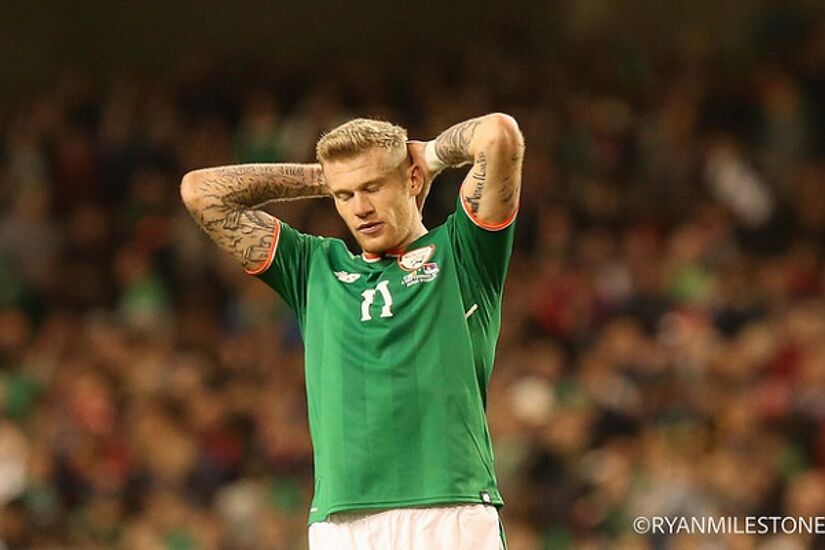Dave Donnelly: James McClean's poppy stance shows a personal bravery rarely seen among modern footballers

Credit: Michael P Ryan (ETPhotos)
This article originally appeared on backpagefootball.com on November 13, 2014
The international break will come as welcome relief for Ireland winger James McClean who has once again become embroiled in controversy over his stance against wearing a Remembrance Day poppy.
The issue of the poppy – or rather McClean’s steadfast refusal to wear it – has been a near-constant source of controversy since the Derryman moved to England in 2011.
His thrilling Sunderland debut – under Martin O’Neill – came in a December fixture with Blackburn Rovers, and thus he avoided the Remembrance Day controversy for a full 11 months.
Even then, the former Northern Ireland U21 international had attracted negative attention owing to his decision to declare his allegiance to the Republic of Ireland national team.
So it was inevitable that by the time Remembrance Day rolled around in 2012, his quiet and unpublicised decision to decline to wear the emblem on his match shirt would be viewed along sectarian lines.
Sunderland’s Premier League clash with Everton in November 2012 saw the club roll out a specially embroidered poppy-emblazoned shirt – worn by Republic of Ireland teammate John O’Shea but not McClean – and the club defended his conscientious decision.
However, McClean endured a difficult second season at Sunderland where his form dipped dramatically as opposition players learned to neutralise his attacking threat, and the poppy controversy compounded his unpopularity among home fans and his refusal to wear the poppy became a convenient point of contention.
After finding himself surplus to requirements at Sunderland following O’Neill’s departure, McClean dropped a division to join Wigan Athletic. He was injured the first time Remembrance Day rolled around as a Wigan player, but it inevitably came to a head again last weekend.
In a pre-emptive move to defuse tensions, McClean issued a PR-crafted open letter to Wigan chairman Dave Whelan – himself the grandson of a Tipperary-born serviceman killed in action during World War One – to explain his refusal to wear a poppy, and his thoughtful and sympathetic explanation has generally been accepted with understanding.
He shouldn’t have needed to explain himself at all – no individual in a free society should be compelled to wear a symbol they don’t agree with – but predictably McClean was booed upon his introduction in Wigan’s 3-1 defeat at Bolton, despite creating a consolation goal with his first meaningful touch of the game.
Though the poppy began life with American Legion as a means of honouring those who were killed in World War One, in recent years it has become an all-encompassing tribute to soldiers who have died in service to the British Empire and one that, on television at least, has become almost mandatory.
Many public figures in the United Kingdom – Englishman Jon Snow the most vociferous – have condemned what they see as ‘poppy fascism,' an arguably crass term to describe the attitude expressed towards the small minority who choose not to wear the poppy, regardless of their reasoning.
The British Legion recently condemned the decision of BBC Radio not to playlist a cover version of ‘The Green Fields of France’ – Scot Eric Bogle’s folk lament to the fallen of World War One – which omitted two verses that change the famously anti-war song to an arguable celebration of war.
Bogle protested against the verses’ omission – arguing it leaves out the major point he was trying to make with the song – but the sense of entitlement that the poppy lobby has inherited means they fail to see the central contradiction, much less the myriad other objections that can be levelled at the campaign.
Football in particular has embraced the symbolism of the poppy wholesale. The England football team were disallowed by FIFA to wear the political symbol on their shirts in a game against Spain, prompting Prime Minister David Cameron to urge players to ignore the ruling.
It has become customary for all players at Football League sides to wear it in the lead-up to Remembrance Day.
In Ireland, Taoiseach Enda Kenny has been among those to wear the poppy in quiet appreciation of Irish soldiers who died in World War One, but in the UK it has a very different meaning, one that many Irish people – whether they express it publicly or not – feel is incompatible with their own experiences.
For McClean – and for a great number of Irish people – the poppy doesn’t just symbolise those who were condemned to death in the successive World Wars, those who fought for freedom from tyranny, but those British soldiers who fought for the precise opposite.
The poppy remembers those British soldiers who laid siege to Dublin on Easter Monday in 1916, those who murdered 13 innocent people in cold blood on Bloody Sunday 1972, and those soldiers who were reputed to be involved in many other massacres of Irish people during the Troubles.
Simply put, the poppy doesn’t just honour those who fought against aggressive imperialism in World War One, for which is was originally intended – it also honours those who fought on behalf of British imperialism in Ireland, as well as every contentious war the United Kingdom has become embroiled in since.
McClean hails from the Creggan estate in Derry – a fervently nationalist area in a majority nationalist city – where the civil rights march on Bloody Sunday began its march before those 13 innocent people were massacred by British forces. It can’t be understated what an effect this would have on anybody from the city.
It’s understandable that many English people don’t understand where McClean and other Irish people are coming from, but the fact he needed to explain himself to begin with goes to show how little understanding there is of the role the British state – and the British Army in particular – has played in Irish history.
And it goes to show that whatever negative publicity McClean has brought on himself through his imprudent use of social media, his persistence refusal to take the easy option and wear the poppy – to the detriment of his footballing reputation and earning power – demonstrates a personal bravery rarely seen in modern footballers.

